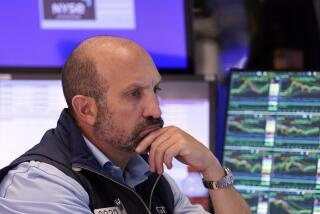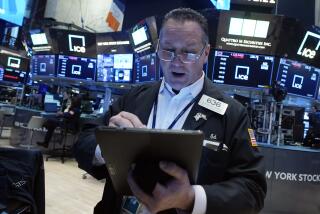Asia Stocks Down in Reaction to Dow Fall : Foreign: But the response to the Dow’s 96-point plunge on Friday is milder than many traders had expected.
- Share via
Foreign stock markets fell in early trading today in the first day of activity following Friday’s 96.24-point drop in the Dow Jones industrial average, although the response initially was milder than many traders had expected.
In early trading, Japan’s Nikkei index dropped 262.53 points, or a relatively mild 1.3%, to 20,092.91. The broader Topix index of all shares on the first section of the Tokyo Stock Exchange was down 9.64 points, or 0.60%, at 1,605.16.
UBS Securities manager Shigeru Akiba said “market sentiment is still OK. I wouldn’t say it’s strong, but it’s firmer than expected.”
In addition to the U.S. stock plunge, investors are also closely watching the Japanese government for any announcement today of a fiscal support package, Tokyo traders said.
Key stock indexes fell 2.6% in Australia, 2% in New Zealand and 1.5% in Singapore.
One of the biggest opening drops came in Hong Kong, where the Hang Seng index lost 2.9% in the first few minutes of trading. In Malaysia, the Kuala Lumpur composite stock index lost 3.9% to 1,102.16.
Although drops of 2% or more are significant by U.S. standards, many smaller Asian markets are by nature volatile and often rise and fall by these amounts.
In Hong Kong, traders said, they expected the market to overreact and further moves will be dictated in part by how U.S. markets react today.
Traders in Europe were also expecting declines.
In Tokyo, the dollar opened stronger against the Japanese yen, trading initially at 109.13 yen. The dollar’s added strength came because investors earn more for their dollars when interest rates rise. In Hong Kong, gold fell $1.08 an ounce on Monday to $386.68.
The Dow’s 2.4% tumble Friday came after the Federal Reserve Board, acting to head off inflation as the economy continues to expand, bumped short-term interest rates by raising the federal funds rate--the rate banks charge each other for overnight loans--to 3.25% from 3%.
Although the increase was tiny, the move was important because it is the first such action in five years by the Fed. Some analysts are seeing it as a possible precursor to further tightening.
Indeed, Treasury Secretary Lloyd Bentsen, speaking on NBC’s “Meet the Press” Sunday, said it is possible the Fed may raise rates again, and the Clinton Administration won’t try to dissuade it from doing so. “That’s always a possibility,” Bentsen said of another Fed hike. Bentsen declared that inflation is under control, predicting that consumer prices will rise about 3% this year, up a shade from last year’s increase.
Bloomberg Business News contributed to this report.
More to Read
Inside the business of entertainment
The Wide Shot brings you news, analysis and insights on everything from streaming wars to production — and what it all means for the future.
You may occasionally receive promotional content from the Los Angeles Times.










